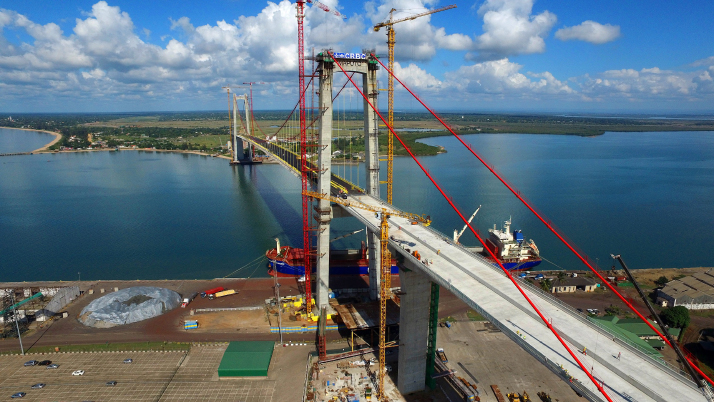|
||||||||||
| Home Nation World Business Opinion Lifestyle ChinAfrica Multimedia Columnists Documents Special Reports |
|
||||||||||
| Home Nation World Business Opinion Lifestyle ChinAfrica Multimedia Columnists Documents Special Reports |
| ChinAfrica |
| Capacity to Do More |
| The Central Economic Work Conference signals that China will further strengthen cooperation in production capacity with African countries |
| By He Wenping | VOL.11 February ·2019-02-13 |

The annual Central Economic Work Conference held in Beijing in late December 2018 set its sights firmly on addressing the challenges in the current economic development in China and uncertain global economic situations in 2019. The conference called for more efforts to advance all-round opening up as well as promote joint construction of the Belt and Road Initiative by giving full play to enterprises' role in the process so as to effectively manage and control various risks. In this vein, China will soon organize the Second Belt and Road Forum for International Cooperation to help build a community with a shared future for humankind. Actually, how to make better use of Chinese enterprises' excessive production capacity and improve their capacity in infrastructure construction are not only the difficulties in China's future economic development. These are also the tasks and challenges of the Chinese enterprises in their international cooperation, especially in China-Africa cooperation.
Mutually complementary
China-Africa cooperation in production capacity is the natural result of economic globalization, which is in line with the realistic demands of China-Africa development and can benefit both parties. On the one hand, China is now in the mid- and late-stage of industrialization after 40 years of reform and opening up and has accumulated massive production capacity. In addition, China boasts capital, suitable technologies and equipment, as well as abundant experience of developing from an agriculture-based country to the "world's factory." China is deepening its economic transformation and upgrade with demands of transferring its high-quality excessive production capacity and advanced equipment and technologies to overseas markets.
On the other hand, most African countries are in the preliminary stage of industrialization with great demands for products such as steel and cement, which they have to import from the international market. They hope to introduce the production capacity in these areas so as to accelerate their industrialization process. African countries have abundant resources, low labor costs and extensive market potential. China's production capacity, equipment and technologies are perfect for Africa's development. In this sense, Africa can be important destination to receive China's production capacity, equipment and technologies. This can help diversify their economic development and promote industrialization.
More importantly, China also designed policies to encourage China-Africa cooperation in production capacity. Since the Chinese Government put forward the Belt and Road Initiative in September 2013, promoting China-Africa cooperation in production capacity and infrastructure construction in Africa has been the main part of China-Africa economic cooperation. Chinese President Xi Jinping and Chinese Premier Li Keqiang, while visiting Africa in 2013 and 2014 respectively, promoted the construction of a high-speed railway network, expressway network and regional aviation network in Africa, as well as African industrialization. At the Johannesburg Summit (2015) and Beijing Summit (2018) of the Forum on China-Africa Cooperation (FOCAC), China announced 10 China-Africa cooperation plans and eight major initiatives respectively, both with $60 billion of financial support, to encourage China-Africa industrialization cooperation, agricultural modernization and infrastructure construction.
At the same time, African countries also responded actively. During the FOCAC Beijing Summit in September last year, 28 African countries and the African Union signed the memorandum of understanding (MoU) on the Belt and Road Initiative with China, increasing the number of Africa countries signing the MoU with China to 37. Africa is the most active continent in promoting the Belt and Road construction.
Early success
China-Africa cooperation in production capacity has yielded preliminary results in recent years. To date, China has built 25 economic and trade cooperation zones with more than 400 enterprises and investment exceeding $6 billion, covering sectors such as energy, light industry, construction materials, textiles, manufacturing and home appliance. With an output value of $18.9 billion, these enterprises have paid $900 million in tax to the hosting countries and hired about 41,000 local employees, greatly promoting local economic development.
Some African countries that have been conducting production capacity cooperation with China, such as Ethiopia and Tanzania, have witnessed early success.
A country lacking natural resources, Ethiopia follows the development road of economic diversification and industrialization and has taken the lead in aligning its development strategy with the Belt and Road Initiative. The country has seen its annual GDP grow at a rate of more than 10 percent in the past 15 years.
In infrastructure construction, some important projects also witnessed substantial progress in 2018. On March 28, 2018, the China-built Kariba South hydropower expansion project in Zimbabwe was completed. It is now the largest hydropower plant built after the independence of Zimbabwe. On July 5, 2018, the International Free Trade Zone in Djibouti, jointly developed, constructed, managed and operated by China Merchants Group, Port of Dalian and the Djibouti Government, came into service. Occupying an area of 48.2 square km, the free trade zone is one of the largest free trade zones in Africa and will be the important link in the Belt and Road construction. It is expected to generate $4 billion in economic benefits within the 40 years of development period and will make Djibouti an important logistics hub in East Africa and even globally, as well as a regional maritime transportation and commercial center.
Other important projects include the progress in the construction of the Nairobi-Malaba Standard Gauge Railway in Kenya and the completion of the Maputo Bridge and link roads in Mozambique.
Deepening cooperation
This is the first year to implement the eight major initiatives put forward at the FOCAC Beijing Summit. While visiting Senegal, the last leg of his four-nation trip in Africa in early January, Wang Yi, China's Minister of Foreign Affairs, told the press that China had started making plans for the implementation of the outcomes of the FOCAC Beijing Summit soon after the summit concluded and had worked actively with African countries to sort out the major areas and key projects for cooperation. In the next phase, China will keep close communication with African countries, especially Senegal, the co-chair of FOCAC, to make tailored country plans by reasonably allocating resources such as assistance, loans and investments to develop different plans for different countries and benefit Africa as a whole.
In the coming three years, China will build and upgrade a number of economic and trade cooperation zones to promote industrialization in Africa, and encourage Chinese enterprises to increase investment in Africa, especially in manufacturing, agriculture, financial service, trade and logistics and digital economy. This will accelerate industrialization and agricultural modernization in Africa.
In 2019-21, China will dispatch 500 senior agricultural experts to Africa and launch 50 agricultural assistance projects in African countries, with a focus on increasing the yields of crops such as maize, rice, wheat, cassava and cotton. In terms of infrastructure connectivity, China will work with the African Union to develop a plan for China-Africa infrastructure cooperation. Based on the plan, China and African countries can promote cross-country and cross-region connectivity projects. In terms of trade facilitation, China supports African countries in participating in the China International Import Expo and increase and facilitates China-Africa trade in agricultural products. In addition, efforts will be made to promote cooperation in e-commerce.
With the deepening of China-Africa cooperation in production capacity, China's economic restructuring and Africa's industrialization will advance together, and will work together to secure a brighter future.
(Comments to niyanshuo@chinafrica.cn)

| About Us | Contact Us | Advertise with Us | Subscribe |
| Copyright Beijing Review All rights reserved 京ICP备08005356号-5 京公网安备110102005860号 |